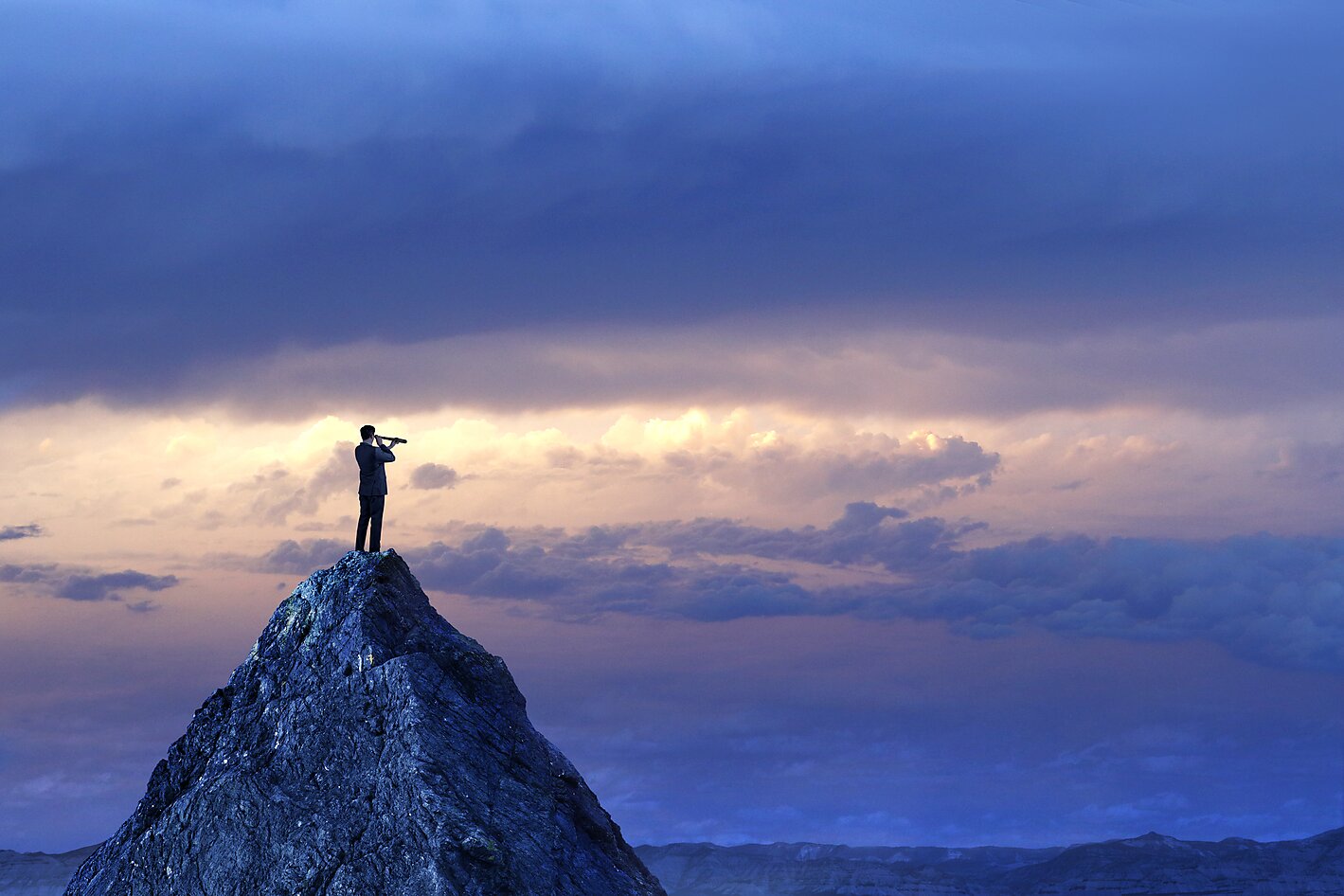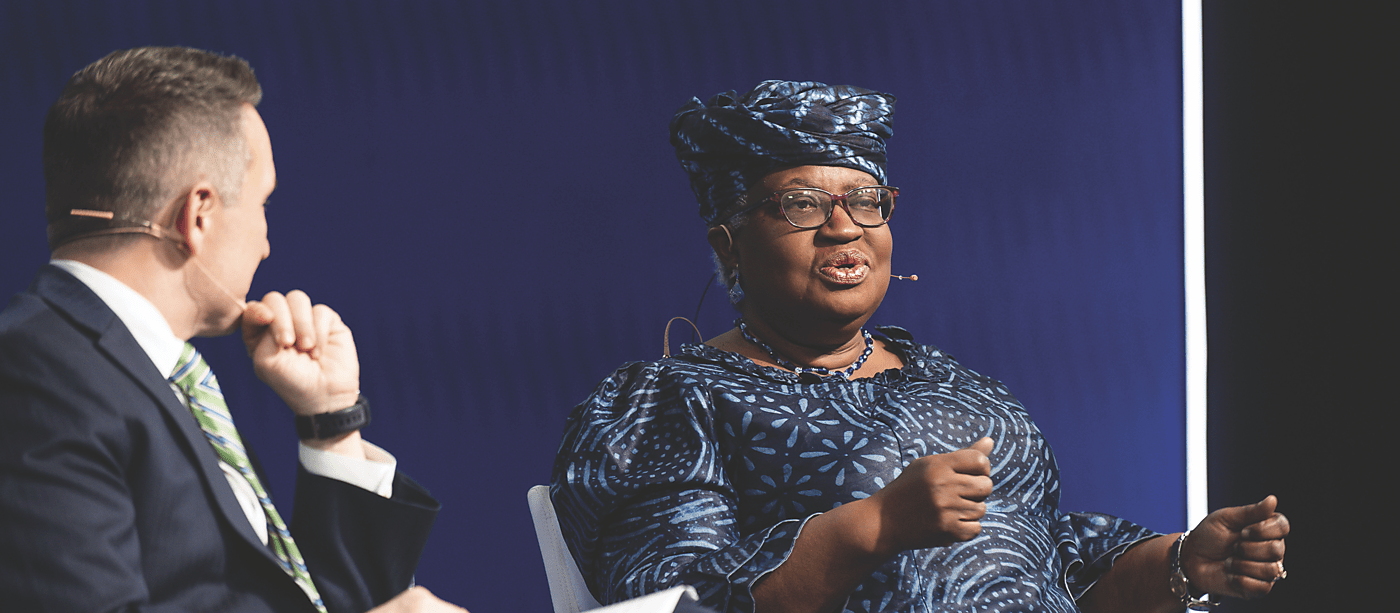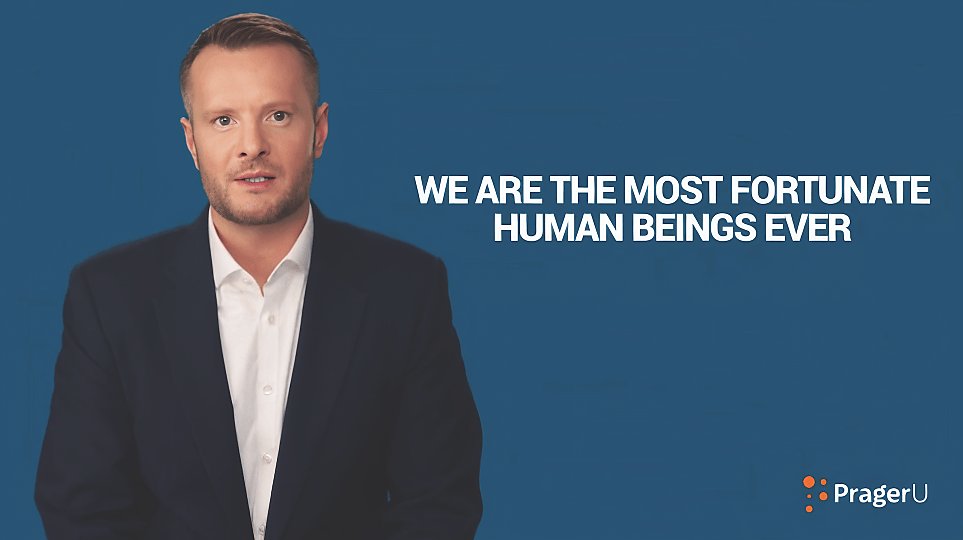We face an intellectual crisis, with dangerous ideas—anti-capitalism, anti-globalism, and nationalism—on the rise. Cato’s role is to change the narrative and create a presence for libertarian ideas in the national policy debate. This means a vigorous defense of how globalization changes people’s lives for the better; how capitalism can save the world; and why we should be optimistic about human progress.
Changing the Narrative on Human Progress
We live in an age of unprecedented progress and abundance, thanks to individual liberty and free markets. But continued progress and prosperity are never guaranteed, and the very systems that created this abundance—free enterprise and free trade—are under attack from across the ideological spectrum.
Defending Globalization
Humans are unique in our ability to peacefully exchange goods to meet our needs and improve our lives. As Adam Smith wrote in The Wealth of Nations, “Man is an animal that bargains.” Globalization is primarily a story about humanity—ordinary people working and interacting, bargaining, buying, and selling in a world economy. Calls by populists on the left and right for the “death of globalization” ignore the endless data on the practical and moral benefits of open, globalized markets: millions of people lifted out of poverty, increases in global human prosperity and well-being, and the spread of human rights and the rule of law around the globe.
In 2023, Cato launched a strategic new project that will change the conversation and reframe the debate on global markets: Defending Globalization, led by Scott Lincicome, vice president of general economics and the Herbert A. Stiefel Center for Trade Policy Studies. The project’s goal is to correct the record on globalization—what it is, what it has produced, what its alternatives are, and what people think about it—and to offer a strong, proactive case for more global integration in the years ahead.
The project features dozens of essays—from scholars both within Cato and beyond it—explaining globalization’s overwhelmingly positive effects, as well as events, videos, a quiz, and other multimedia content to tell compelling human stories in impactful ways. We’re featuring the faces of globalization—the American autoworker, the Guatemalan textile worker, the young online gamer—whose lives were all made better because of trade and the ability to exchange across borders.
In January 2024, Dr. Ngozi Okonjo‐Iweala (right), director‐general of the World Trade Organization (WTO), joined Scott Lincicome (left), Cato’s vice president of general economics and the Herbert A. Stiefel Center for Trade Policy Studies, at the Cato Institute to discuss the threats facing both the WTO and globalization more broadly.
In November, Cato held a private launch event for the Defending Globalization project, featuring a speech from former US trade representative Robert Zoellick. In January 2024, Cato hosted a conversation with World Trade Organization director-general Dr. Ngozi Okonjo-Iweala about the state of globalization. In her opening remarks, she complimented Cato’s new series, “which has looked at all aspects [of globalization].” The following month, former Treasury secretary Lawrence H. Summers spoke with Lincicome about the future of globalization and the role of US policy in shaping the future of the world economy.
A Different Spin on March Madness
The Cato Institute continues to innovate with creative ways to teach bigger and newer audiences about freedom and policy. Leveraging the hype around the annual NCAA basketball tournament, Cato assembled its own “Protectionist Madness” bracket of 32 terrible US trade policies that remain on the books. These policies went head-to-head in a classic single- elimination tournament where the votes of website visitors determined, once and for all, which was the “champ” among bad protectionist measures.
The competition was fierce. Despite the United States’ comparatively low average tariff rates, the federal government restricts foreign trade and investment in many other ways, harming American workers, farmers, trading partners, and the economy overall—and fostering political dysfunction along the way. The bracket provided an interactive approach to teaching people about the harms of protectionism.
After seven rounds of voting, 31 matchups, and tens of thousands of votes, the first-ever Protectionist Madness champion was crowned: the Jones Act.
The Cato Institute launched a strategic initiative in 2018 targeting the 1920 Jones Act (a mandate that the sea transport of cargo between US ports be performed by vessels that are US-built, US-owned, US-flagged, and US-crewed) as the quintessential example of how protectionist policies impose significant economic burdens. Cato has brought increased awareness to the act’s harms, which range from high transportation costs within the United States to increased traffic and air pollution and to the prevention of effective emergency response in places such as Puerto Rico and Hawaii. In 2019, the Organisation for Economic Co-operation and Development calculated that repealing the Jones Act could increase US economic output by up to $135 billion.

Cheer Up: Cato’s Case for Optimism Influences the Influencers
Many pundits and politicians claim that free markets have led to growing wealth inequality, resource scarcity, and environmental collapse, with some even claiming that humanity’s future is too bleak to merit having children. With the fruits of capitalism—the most powerful anti‐poverty force in history—so brazenly misrepresented, it’s no surprise many young Americans view it negatively.
The Cato Institute is countering these false narratives head‐on, convincing more people each day that there’s never been a better time to be alive—precisely because of the spread of personal freedom and free markets. And top innovators and technological visionaries are pointing to Cato’s work as an answer to doomsayers.
In September, Cato senior fellow Johan Norberg published The Capitalist Manifesto, a vital exploration of capitalism and the benefits it brings to global society, including reducing inequality, raising living standards, and increasing prosperity around the world. Elon Musk praised The Capitalist Manifesto in a post on X (formerly known as Twitter) in October after seeing it recommended by fellow tech titan John Carmack. Musk wrote, “This book is an excellent explanation of why capitalism is not just successful, but morally right.” The book received additional praise from The Economist and the Financial Times, which named it one of their best books of 2023, calling Norberg “perhaps the world’s most effective defender of free-market capitalism.”
Venture capitalist Marc Andreessen was also inspired by Cato’s research on human progress. His viral Techno‐Optimist Manifesto cites Cato scholars Norberg, Marian Tupy, and Deirdre McCloskey among his select list of “patron saints” of capitalism, optimism, and the benefits of technology.
We’ll Never Run Out of Resources
One of the most pernicious myths propelling calls for bigger government is the notion that an increasing population will lead to resource scarcities. Cato scholar Marian Tupy and adjunct scholar Gale Pooley continue to debunk that narrative with their Superabundance project, which provides overwhelming evidence that resource availability grows faster than the population—as long as government policies don’t stifle human freedom, innovation, or the open exchange of goods and ideas.
Hosted on Cato’s HumanProgress.org, the Superabundance project packages concepts found in Tupy’s celebrated book—Superabundance, coauthored with Pooley—into bite‐sized videos. Tupy has further inspired millions by appearing on programs hosted by Jordan Peterson and Dennis Prager, all while appealing to influential academics such as Jason Furman, former chair of the Council of Economic Advisers during the Obama administration, who said, “Anyone who cares about the future of humanity should read [Superabundance].”
In July, George Will featured the book in his Washington Post column, stating that its calculation of time prices “blows to smithereens the idea that progressivism is conducive to progress.” In September, the New York Times published a review of the book that endorsed its central message: “The doomsayers are wrong.” In January, an NPR blog featured “superabundance” as a nomination for “global buzzwords that will likely be in the headlines of 2023.” The book also received attention from policymakers, including Sen. Rand Paul (R‑KY), who cited Superabundance on Fox Business’s Kudlow.


Tupy also published two op-eds in the Wall Street Journal featuring his work: “Why Is Paul Ehrlich So Hard to Ignore?” and “We Will Never Run Out of Resources.” He continued to showcase his role as one of capitalism’s most compelling advocates in his PragerU video, “I Saw Communism with My Own Eyes,” a summary of his early years in Czechoslovakia that has more than 950,000 views.
“Without freedom of thought, there can be no such thing as wisdom; and no such thing as public liberty, without freedom of speech.”
—Benjamin Franklin
Telling the Story of Human Progress
Countering pessimism about the state of humanity is essential to ensuring that liberty thrives. The spread of free markets and classical liberal values allowed millions of people around the world to escape poverty and live relatively free lives—yet this indisputable fact is often missing in media and classrooms.
HumanProgress.org is our antidote, our one-stop shop of robust evidence and storytelling that vividly illustrates the substantial strides made across the globe. The website is the premier source for research and analysis challenging pessimistic outlooks on the state of the world, offering a collection of resources, data, and articles demonstrating vast increases in human well-being through the adoption of free markets and the spread of individual liberty. It is a prime example of how Cato is bringing liberty to life.
In 2023, HumanProgress.org was redesigned with improved navigation tools and fresh interactive features, a refashioned data section, and new customizable charts and visualization tools that are easier than ever to embed and share across social media and other websites. Additionally, a new “Projects” section of the website highlights the various special initiatives that make HumanProgress.org unique, including a “Classroom Resources” section for teachers.
Debunking Inequality Myths
Despite the well-established evidence for dramatic, global human progress across a broad range of indicators, inequality concerns have received outsized attention from opinion makers in recent years. According to Harvard University’s Steven Pinker, between 2009 and 2016, the share of New York Times articles mentioning “inequality” increased tenfold. However, most of these conversations center on income inequality alone. This narrow view compounds the well‐documented problem that people are spectacularly wrong in assessing both trends in living standards and their distribution.
To combat misperceptions about global inequality, Cato published the first Inequality of Human Progress Index, which surveys international inequality across a greater number of dimensions than any prior index. In the Index, Cato policy analyst Chelsea Follett and George Mason University assistant professor of economics Vincent Geloso examine material well-being and seven additional metrics: lifespan, infant mortality, adequate nutrition, environmental safety, access to opportunity (as measured by education), access to information (as measured by internet access), and political freedom. The results show that across all but two of these dimensions, the world has become more equal since 1990. This directly demonstrates the profound impact that globalization and market liberalization have had in raising absolute living standards while reducing inequality.


